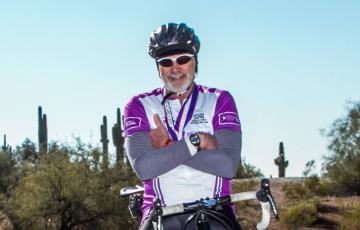Search Results
Interferon alfa-2b
Interferons are substances naturally produced by cells in the body to help fight infections and tumors. They may also be synthetic versions of these substances.
Interferon alfa-2b is FDA approved to treat people who have hairy cell leukemia, polycythemia vera and aggressive follicular non-Hodgkin lymphoma.
Procarbazine
Procarbazine is FDA approved with other anticancer drugs for the treatment of stage III and IV Hodgkin lymphoma. Procarbazine is used as part of the MOPP (mechlorethamine, Oncovin® [vincristine], procarbazine, prednisone) regimen. This medicine may cause a temporary loss of hair in some people. After treatment with procarbazine has ended, normal hair growth should return.

4 Perspectives on How Nonprofits Help
If you want to change the world, there’s more than one way to do it. You could start in your community, helping friends and neighbors. You could also turn to a nonprofit organization—as a volunteer, donor, advocate, or even by joining the staff—to widen your impact.
We know a lot of changemakers at The Leukemia & Lymphoma Society (LLS). Passionate, amazing people who work hard to help us make life better for blood cancer patients, survivors, and their families. They know that we can make the most progress toward a world without blood cancer together.
Surviving Chemo: A Little Planning Goes a Long Way
Just the thought of chemotherapy can be enough to make one feel sick. Toxic drugs powerful enough to kill or damage cancer cells also take their toll on healthy cells. While everyone tends to respond differently, most agree the treatments come with unpleasant side effects.
Check out these 14 tips from The Leukemia & Lymphoma Society that should help make the experience a little less uncomfortable:

Volunteers: The Engine Powering LLS’s Mission
I was always aware that volunteers with The Leukemia & Lymphoma Society (LLS) drive impact for blood cancer patients and families. But it wasn’t until Thanksgiving Day 2007 that I discovered the full force of their power. My wife, Holly, had recently been diagnosed with follicular lymphoma and our family was still reeling from the news. She was feeling quite ill, and we were exhausted with worry and trying to keep life as normal as possible for our two young children.
Cytarabine
Cytarabine is FDA approved to prevent and treat leukemia that has spread to the meninges (the three membranes that cover the brain and spinal cord). It is also FDA approved for use with other drugs to treat acute myeloid leukemia, acute lymphoblastic leukemia and chronic myeloid leukemia. This medicine may cause a temporary loss of hair in some people. After treatment with cytarabine has ended, normal hair growth should return.
Liposomal cytarabine (DepoCyt®) is given by intrathecal injection. It is FDA approved to treat lymphoma that has spread to the meninges.

